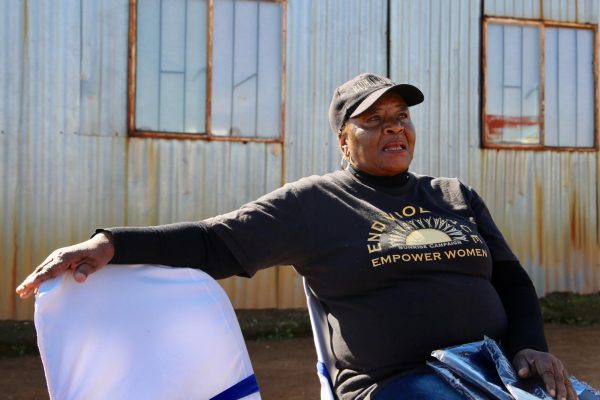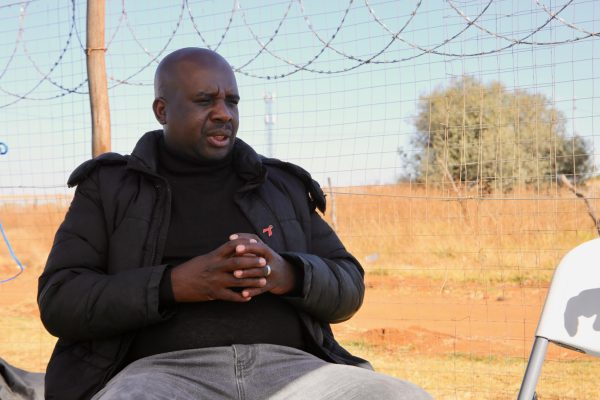ORANGE FARM, South Africa – Rose Thamae was once able to employ 30 people in the men’s division of Let Us Grow, a community organization she founded in 1996 to provide support for human immunodeficiency virus, or HIV positive people, and domestic violence survivors living in Orange Farm.
Today, only 15 remain. The program’s funding is diminished as a result of the Trump administration’s January 2025 cuts to U.S. foreign aid programs, including the United States Agency for International Development and the President’s Emergency Plan for AIDS Relief.
Let Us Grow depended heavily on USAID and PEPFAR funds to implement many of its HIV prevention and treatment services in Orange Farm, a township located 28 miles south of Johannesburg.
“We can’t work without it,” Thamae said.
Like many densely populated townships in South Africa, Orange Farm has borne a high burden of HIV cases due to a range of complex socioeconomic factors. The number of people living with HIV in South Africa is estimated at over 8 million, or 12.8% of the population, according to March 2025 data from The Thembisa Project.
When USAID’s funding was slashed, PEPFAR’s operational reach was weakened. In South Africa, PEPFAR funding had long been channeled through national partners like the Anova Health Institute, which served as an intermediary distributing resources to dozens of grassroots organizations, including Let Us Grow. This caused Anova to halt support for many local programs.

Lerato Magongwa, the coordinator for the Men’s Calabash, the men’s division of Let Us Grow, said he first heard of the loss of funding in the media. That loss has devastated the program, which focuses on men’s health and wellness, offering support groups, HIV testing, tuberculosis and prostate screening, and counseling services designed to reach men who are often underserved by the health system.
“Anova was a very, very, very, very strong partner, and they were funded by USAID and PEPFAR,” Magongwa said. “It was a huge shock to us, not only focusing on us as an organization but focusing on the men that we are servicing in our community.”
Impact on men’s health services
The Men’s Calabash relied on twice-yearly disbursements of 50,000 rand (currently about $2,800) through Anova, said Siphiwe Zwane, a member of the Men’s Calabash. Each installment was expected to stretch across six months, covering transportation to clinics for HIV testing and TB screenings as well as weekly men’s dialogues addressing issues affecting men’s health and well-being.
“We used to transport these men to wherever they could get help,” Magongwa said. “Now, because of the lack of funding, we no longer have money for petrol. We no longer have money to host dialogues for men to gather and talk about issues — issues such as health issues, issues such as gender-based violence, issues such as adherence to medication.”
Prior to the cuts, Anova’s support also allowed the Men’s Calabash to pay stipends to its male outreach team. Once a month, 22 men involved in Let Us Grow’s outreach efforts received stipends — 2,500 rand (currently about $140) for field work and 4,500 rand (currently about $250) for office-based support staff. Today, those payments are gone, Zwane said.
The men who were working saw a direct link between that funding and the expansion of treatment access and reduction of the spread of HIV in their communities.
“Since this funding has started, we saw a huge, huge reduction of HIV infections, together with any other diseases, especially chronic diseases,” Magongwa said. “We saw many clinics being able to be opened, and services were now coming to the communities.”

Magongwa’s observations are supported by data. From 2010 to 2023, the number of people who acquired HIV in eastern and southern Africa decreased by 59% and the number of AIDS-related deaths decreased by 57%, according to a 2024 UNAIDS regional profile.
Another critical service of the Calabash — what Magongwa called a “buddy system” — has stopped entirely.
“If a man comes to us and says, ‘Guys, I would like to go to the clinic, but I’m not confident enough’ … we take them personally and go with them to the health facility, help them to open up a file, help them with the whole process, give them support on that day,” Magongwa explained. “Now, we are no longer able to do so because we are no longer able to transport them. Now, all we can do is to give you a paper and say, ‘Just go to the clinic.’”
A handful of outreach workers, despite not getting paid, continue TB screenings, HIV testing and tracing patients who’ve dropped out of care. But capacity has been severely cut.
“We are no longer able to do our awarenesses, which is our outreaches, also our campaigns,” Magongwa said. “…Now, we are only dealing with local awarenesses where we can be able to just carry our equipment without needing a car.”
Nevertheless, Thamae, affectionately referred to as Mum Rose by residents of Orange Farm, continues to provide moral leadership to her reduced staff.
“I’m always encouraging them,” Thamae said. “We are not doing this for funding. Everything that we are doing, we are doing for the community, even though it’s painful … you have to plunge back. That’s where something will arise.”
Let Us Grow also lost access to their main men’s clinic in Stretford, a suburb of Orange Farm, that served as a safe space from stigma and discrimination for male clients. It was forced to close because it was supported by Anova, which cut back on its staff members after the loss of USAID funding.
Magongwa said even when people mange to get to clinics, long queues and medicine shortages persist.
“Some people would even settle to go to the health facility and sleep outside the night before in order to be the first on the queue,” Magongwa said.
Thamae said the consequences of the cuts are clear in her community.
“Innocent people are suffering, innocent people who don’t even have information,” Thamae said. “You don’t even have access to sit on those big table discussions. You are not involved in it.”
‘People are already struggling’
The South African Ministry of Health stated Feb. 11 it can fill the gap left by the loss of U.S. funding, but Magongwa said that’s far from reality.
“The Minister of Health in South Africa said they have this covered,” Magongwa said. “But truth be told, they are not ready, and we are seeing this as months and weeks go by. People are already struggling to get their medication.”
As part of negotiations for its budget bill, The White House recently announced it would preserve life-saving treatments under PEPFAR as well as some other prevention programs to appease GOP members concerned about cuts to global AIDS funding. Sen. Susan Collins, a Republican from Maine and chair of the Senate Appropriations Committee, has been a strong vocal opponent of cuts to PEPFAR and other global health initiatives.
While Magongwa acknowledges that foreign aid is not a guarantee, he said he believes South Africa’s economy is not yet where it should be in order to independently fund and maintain the community programs previously supported by international aid. As a result, the suddenness and scale of the cuts have been devastating.
“I am scared now that if things do not change, we are going to go back to that same point,” Magongwa said. “We are going to go to that era where we are going to see now HIV and AIDS deaths rising up again because people will not have medication. People will not afford even to go to the so-called nearest clinic.”
VIDEO: MAXIMILIAN MURPHY/THE HAWK














































